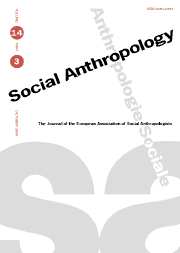No CrossRef data available.
Article contents
L’imposition d’une frontière. Sociétè et idéologie à Trieste, entre municipalité, nationalité et empire, 1717–1914
Published online by Cambridge University Press: 02 January 2001
Abstract
The lack of an autochthonous frame of the notion of ‘frontier’ in Trieste, a coastal town in the north-east of the Adriatic Sea, calls for an anthropological reflection on its eighteenth- and nineteenth-century history. The analysis of its social structure and evolution as a free port established by the house of Habsburg constitutes the place of departure for the observation of the tension between feudal, national, imperial and universal forms of political sovereignty within the context of a society composed of different linguistic and religious traditions. The centrality of the ancient municipal reference is recognised as the main factor of continuity and social integration among these groups and their principles of political identification.
- Type
- Research Article
- Information
- Copyright
- © 2000 European Association of Social Anthropologists




